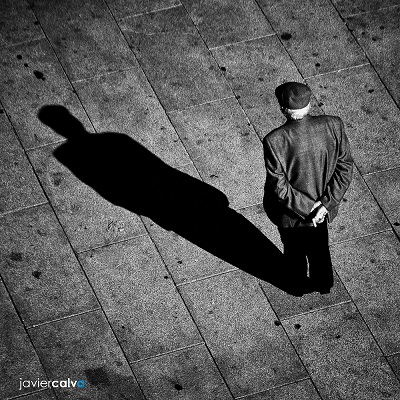Chapter Two: Names
“The tribe, huh? You should take advantage of that.”
I was sitting in a downtown cafe with my former political science teacher, Kincaid, who as far as either of us knew had not a drop of Jewish anything in him and distrusted all religions even more than Sammy because his parents had mindlessly brought him up what he called “Catholic stupid”.
“Vague,” is the way Kincaid described those early religious teachings, “because my parents were working-class ignorant and didn’t care what I was taught. They just went along with what the neighbors were doing and didn’t ask what the nuns did those Wednesday afternoons we had religious instruction. They figured the threat of eternal punishment would make me want to be good, which to my parents meant keeping my mouth shut in front of grownups and not shouting ‘fuck you’ at my classmates in the schoolyard.
“Back then the conventional mindlessness was that without the iron-fist teachings of the Holy Catholic Church we boys would attack each other for nothing, masturbate in a garage, and have sex with our sisters. But even at eight-years-old I sensed there was something shady going on with that heavy-handed religious instruction so the first day when I had to introduce myself and say something, I said, ‘I don’t like Father Caspar because he squeezes my ass and he smells bad.’ That remark set the nuns on guard and the nastier ones singled me out for special attention.
“I fast became an example of someone who needed to be disciplined because I always answered, ‘I don’t know,’ when the Mother Superior asked me questions like, ‘Why is the Eucharist offered for the faithful departed who still are in Purgatory?’ and, ‘What is the name of the son of God our Father who gave His life to save us and was crucified?’ I shook my head defiantly silent, even when one of the kind nuns hinted, ‘Our Lord’s name begins with the letter J and ends with an S.’ I took my smacks, kept a contemptuous look on my face and just repeated to every question, ‘I’m sorry, Sister, but I don’t know the answer to that one either. Can you give me another letter?’ It was a fight for weeks that I kept losing with a red-sore butt until finally even the nasty nuns got tired of paddling me and let me sit in the back by myself. I’d become God’s problem which was fine with me.”
At ten, Kincaid had gone into an empty church, stood before the altar, stamped his foot, and said, “I’m here, God, and I don’t believe in you. So if you’re going to do something bad to me and show how tough you are, let’s see you try.” When the hell-fires he’d been scared with didn’t start up, he stamped his foot again and said, “I’m waiting and I don’t have a lot of time. Let’s see what you got,” walked around a bit then went back to the altar and said, “I’m still waiting, last chance,” stood there defiant and said, “That’s it. You and me we’re finished,” then turned around and left. After that experience, he was cured of the heaven and hell and Holy-Savior superstitions for good.
Over the years, watching the other kids fall into fearful line from his seat in the back only convinced him that his parents’ religion was a dirty game that needed serious alteration quick before his classmates with their wide-open trusting faces turned self-mistrustful, anti-sex, and fearful for the rest of their lives, especially the girls.
One joke Kincaid liked to tell in his tutorials was Eastern European: “Question: why are there so many orphans in Romania? Answer: because there are so many priests.” When the college administrators heard about this teaching tool, Kincaid had been called in for a chat with the academic dean. Kincaid always claimed they’d had a friendly conversation about freedom of speech, religious bigotry, sectarian fanaticism, and brain washing but the next year he wasn’t rehired and I had to chase him down to his next position and the three or four after that because the college administrators judged him insubordinate and promiscuous. He did a good number of semesters knocking about academia until with the help of a friend he was able to lock tenure and, after years of my hounding him, he finally accepted I was determined to keep him in my life. One day he simply told me, “Let’s meet for coffee once in a while. It’s more convenient than your waiting outside my apartment building to way-lay me.”
According to Kincaid the irreverent spice in Eastern European humor came from centuries of violent oppression and genocides, not just a few thousand random killings, hundreds of thousands of them orchestrated for hundreds of years non-stop, and not just by the religious fanatics but by the Mongols and other roving gangs of murderers. Kincaid taught that those Mongols especially knew what the word slaughter meant, and it wasn’t for them a truck bomb in Baghdad that killed eighty people, mostly women and children: it was wholesale devastation down to the charred tree stumps and all the men killed as in every single one. When the Mongols left a village that had needed a lesson, it was Chernobyl: no one lived there for the next hundred years.
“Eighty killed would be five minutes’ work in Moldavia in the thirteenth century,” Kincaid lectured when every once in a while he had to lecture, “and a regular event without pause, then on to the next three mass killings before lunch. They burned the villages to piles of black stones. Now those Mongols they knew how to make European blood flow. These jihadists are doing what they can to carry on the tradition, but they just don’t have the same blood-lust. Not like those killers. Those beasts weren’t pulling any rah-rahs out of a rag-bag like ‘we’re making the world safe for democracy’, or ‘death to the infidels’, or ‘the communist menace must be faced’, or ‘the free market best determines asset price’, or ‘God is great’, or ‘single-payer health care will bankrupt our country’. They didn’t have slogans and they didn’t need them. They had muscles, sharp swords, cruelty and the stake, and they did fine with saying, ‘We’re strong and mean and if you don’t do what we want, you will die painfully.’”
“We’re all descended from these and other killers if you scratch the surface,” he told me often enough, “so this narrow Jewish ancestry path you’re jogging along will prove just to have put a stone in your sneaker is what I think.”
“A pretty big stone.”
“Maybe not. You keep digging you may find out your great great maternal grandmother was born in Kenya to a tenant farmer with deep black skin, black and shiny as black ivory, big strong calloused hands, broad shoulders, a lively mind, a devilish sense of humor, and good teeth.”
“Maybe she was African and who cares?”
“Not me.”
I’d sat down with Kincaid to talk to him about changing my name and he took that subject like he took everything else: he shrugged, “What difference would it make?” So I explained to him what Sammy had said about me looking sneaky and I wanted to take steps to make myself who I was and let everyone know me right from the start before I had a nervous breakdown.
“You serious?”
“I am.”
“You’ve finally gone completely out of your mind,” Kincaid told me.
“That’s because you haven’t lived your whole life as someone else.”
“So you’re someone now?”
“Beginning to be.”
“Let me know how it works out so I can visit you in the sanitarium.”
“I mean it. I’m talking about establishing a solid personality.”
“Good luck.”
“It’s worth a try.”
“Maybe, and maybe a solid personality’s a primitive fantasy. But if your psychic search doesn’t work, your new pedigree should scheme you a bed in a Jewish hospital for the poor. I hear they’re the better ones, especially for those with chronic identity problems.”
I’d told Kincaid I wanted to be called “Blechner” and he shook his head at me bewildered.
“Where’d you dig that one up?” And when I told him I’d heard something like it around he told me to get on to a second choice.
“Blechner? I’ve never heard that name.”
“So?”
“There aren’t enough vowels. It doesn’t sound pretty.”
“Maybe not to you but to others it could be.”
“Like who? The Maccabees?”
“Maybe.”
“Listen, Blechner-To-Be, the problem is Blechner sounds deep-Brooklyn-Jew, and you don’t fit deep-Brooklyn-Jew no matter what’s on your dad’s birth certificate. You need to come up with something more secular, something vaguely-Jew sounding and cosmopolitan that could also be seen as Austrian.”
“Like what?”
“How about ‘Shmarmel Kissinger’? A World-Theorist and Arms Merchant?”
“I’m serious.”
“How about Arnie Shtemmelf?”
“That’s vaguely-Jew sounding?”
“To me it is. It could be Jew could not, and most people won’t care long enough to check. Not in the large urban areas anyway. Something sounds like ‘bread’ in Shtemmelf. You could be descended from medieval German bakers. You could be mixed-Lutheran or light-Jewish.”
“Shtemmelf has two vowels, same as Blechner.”
“So make it Shtemmelhoff. Guido Shtemmelhoff, to play in your Italian side and keep you murky.”
“But murky is what I don’t want. I’ve been murky my whole life.”
“Your murkiness never bothered me.”
“No?”
“Humans are complicated incoherence, Guido-Blechner, most of us, and inherently unstable mental cases especially when stressed. If you’re looking for clarity and consistency, I’d move on to another species.”
“I’m sticking with our species.”
“How about ‘Stymie Wolfowitz’?
Silence.
“What’s the matter with ‘Wolfowitz’? That’s still a smart Hebrewish name to some war-mongers in the diplomatic corps. It rings brainy, at least early-on, and so long as the war you start doesn’t drag on too long and it’s the working-class children who are getting maimed and killed.”
“I’m sticking with Blechner.”
“Fine. But if you’re searching out the cause of your inner turmoil, this ethnic confusion might not be your problem.”
“You don’t think so?”
“Maybe not,” he said thinking. “How’s that play coming, the one I liked?”
“All right,” I said uneasily.
“You done yet?”
“Yes.”
“I mean done done done. As in done.”
“I am done. Pretty much.”
“Either you’re done or not, Stymie.”
“I’m done. Just a few small adjustments in the second act.”
“So a few more adjustments?”
“That’s all.”
“It’s been a while now on this play, right?”
“About thirty years.” And when Kincaid nodded distantly I added, “Well, thirty-two years.”
“Thirty-two years to write a play? Doesn’t that seem like a long time to you?”
“Yes.”
“It’s ninety pages isn’t it?”
“About.”
“That’s less than three pages a year.”
“But each page is important.”
“Sure it is.”
“And I don’t work on it every day.”
“Noel Coward wrote Private Lives in a weekend.”
“I heard that but I don’t think it’s true.
“It’s true enough. He was on a cruise.”
“Maybe Coward did write it that fast and maybe that’s why you don’t see that play performed anymore. He rushed it.”
“It’s revived occasionally.”
“Mostly regionally. And if you study it, you’ll find serious problems in the second act.”
“Really?” he said amused. “You think the second act has problems?”
“The second act is embarrassing. It’s weak and it’s not funny.”
Kincaid glanced furtively around the room as if he were planning an escape. “Do you want to talk about the popularity of light-theater-romantic-trash,” he said suddenly weary, “that some people call a fun-night-out?”
“No.”
“All right, then. Your play’s serious, isn’t it?
“Well a serious comedy.”
“Like Moliere.”
“Well – ”
“OK, look, whether you’re a Moliere-Part-Two-Wannabe or not, Moliere wrote fast too.”
“I know he did.”
“So what’s going on with your play these days?”
“It’s a couple of things.”
“For instance?”
“The female lead needs one more pass.”
“Like hell,” he said.
“Well she does.”
“It’s fear. That’s why you’ve gone off on this Blechner jag.”
Silence.
“Maybe a little,” I said. “I won’t say there’s no fear. I’ve been smacked
around.”
“Who hasn’t?”
“I know.”
“Some of Moliere’s plays were banned.”
“I know they were.”
“He was imprisoned.”
“I know.”
“Well?”
“Fear or not, the female lead needed to be enormous and she is now, almost.”
“Listen, Blechner, your play’s solid, you need to give it a chance. You’ve got a strong female protagonist and colorful characters in conflict in a believable setting and you observe the unities. You need to get it on stage and take your shot.”
“I am almost.”
“OK.”
“I am really.”
“All right, I believe you. I’ll start saving for a ticket. But a writer needs to be fearless.”
“I know.”
“A writer needs to tell anyone, ‘You don’t like what I wrote, that’s fine, you’re certainly entitled to your opinion in this great country of ours, I respect it and I welcome it warmly, and by the way: now get the fuck off.’”
“I know.”
“And fuck off with your kids too. And your dog. Warmly, in our great country.”
“I know.”
“So? You’re a writer, aren’t you, Stymie?”
“Aspiring.”
“What?”
“Yes.”
“Good. Aside from being a recently discovered half-Jew and messed-up in the head you’re a writer so how come you don’t act like one? You waiting for H.L. Mencken to approve you?”
When I didn’t answer right away Kincaid signaled for the check and said, “Come on, Moliere-Part-Two-Wannabe-Stymie-Blechner, I’ll walk you to the corner.”
When I had interviewed for Kincaid’s tutorial he took his time and listened to me which was an enormous improvement over the interviews I’d had with other faculty. The other professors couldn’t wait to get rid of me and they didn’t bother to conceal their impatience. They all gave me the strong impression that they had much better things to do than to talk to me, but not Kincaid. He was in no rush so I was the one who had to end the interview but not before he told me he wanted to work with me on a course of study he termed “The Politics of Optimism”. I’d need to read one book a week and talk to him for an hour Friday afternoons. If I didn’t read the books or didn’t come to meet him, he didn’t care, and he said, “I’ll pass you anyway if that’s all you want.” He asked if I’d ever read Max Weber, or “Reflections on Violence”, or Robert Michels’ “Political Parties”, or Freud’s “Civilization and Its Discontents”, or Veblen, or Spengler, and when I said, “No,” he said easily, “All right. We have some reading to do,” and passed me a form to fill out.
I put in my personal information but when I came to the course title, I asked peremptorily like the oblivious and self-important shit I was at twenty-two, “Was optimism spelled with a ‘t-o’ or a ‘t-i’,” in an off-hand disrespectful way as if I were talking to someone beneath me. I was affected to the bottom of my being when Kincaid responded in a wounded tone, “Optimism is spelled ‘o-p-t-i-m-i-s-m’” and gazed at me uncertainly with the question, “Why are you treating me like I’m your servant?” From that small interchange, he became someone I was determined to keep in my life.
Though I couldn’t phrase it then I sensed here at last was someone who could teach me at twenty-two-years-old what the word “decent” meant. I had just met an adult male I could trust.






Be First to Comment